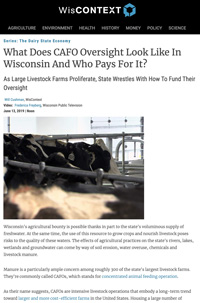As Large Livestock Farms Proliferate, State Wrestles With How To Fund Their Oversight
Highlights from an article by Will Cushman published on WisContext.com on June 13, 2019 and on Wisconsin State Farmer website on June 19, 2019.
A proposal by Democratic Gov. Tony Evers to significantly increase CAFO permit fees to fund up to five new CAFO oversight positions at the DNR was rejected by the Republican-controlled state Legislature during its 2019 budget-writing session. The governor had proposed increasing annual fees to $660 and adding a new permit fee of $3,270 to be paid by CAFOs with active permits every 5 years.
Instead, the Legislature’s budget committee, voting along party lines on June 11, 2019, approved adding four positions for CAFO oversight under the plan that mirrors a Republican-sponsored bill previously introduced in the state Senate. That plan would redirect all of the revenue from the current annual fees to the DNR for CAFO oversight. This would furnish the program a little over $100,000 in the 2019-20 fiscal year, enough to cover roughly 4% of its costs.
The Wisconsin Dairy Alliance, a lobby group that advocates primarily for dairy CAFOs and which formed immediately following the publication of Evers’ budget proposal, has said the proposed fee increase would unnecessarily burden farming businesses that are already contending with a 5-year slump in milk prices.
“We’re all struggling,” said Cindy Leitner, president of the Wisconsin Dairy Alliance, in a May 31 interview on Wisconsin Public Television’s Here & Now. “We’re struggling to survive. Added fees aren’t going to help.”
Leitner also questioned whether more CAFO oversight staff at the DNR is necessary. “Do we need to have more positions?” Leitner asked on Here & Now. With 14 field staff responsible for oversight of about 300 CAFOs — a staff-to-CAFO ratio of nearly 22:1 — there should be more than enough time for staff to conduct site visits, review permits and enforce compliance, she said.
In fact, Leitner suggested DNR staff should be visiting CAFOs more often. From the Wisconsin Dairy Alliance’s perspective, she said, “at least once a month [DNR staff] should be on the farm talking to the dairy [farmer] or talking to somebody about what they’re doing, how they’re doing it, how they can do it better and building that relationship so that we’re all looking toward no discharge in water.”
Read this article in its entirety at https://www.wiscontext.org/what-does-cafo-oversight-look-wisconsin-and-who-pays-it



